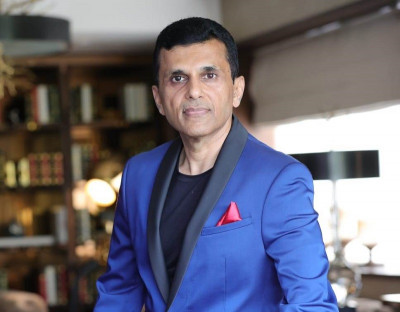Dubbed foreign films corner profits in ways that are detrimental to Indian cinema: Anand PanditÂ
Indian film producer-distributor Anand Pandit has made his recent foray into the South Indian film industry with a Kannada co-production, ‘Kabzaa’. His recent films, ‘Thank God’, ‘Doctor G’, ‘Fakt Mahilao Maate’ studded with stellar star cast like Ayushmann Khurrana, Amitabh Bachchan, Ajay Devgn, Rakul Preet Singh, Sidharth Malhotra, Randeep Hooda, have been hits at the box-office. There are several movies lined up for 2023 as well.
In this interview with Adgully, Anand Pandit talks about the hybrid release model of films, OTT piracy, challenges that the Indian film industry faces, and more. Excerpts:
You have finally made the foray into the South. What prompted you to take the plunge?
I have been exploring regional industries, and just this year my Gujarati film, ‘Fakt Mahilao Maate’, did very well in theatres, and this month my Marathi horror comedy, ‘Victoria’, will be released. I have also been observing the South Indian industries with great interest over the past few years. Apart from critical acclaim, they have also notched up staggering box-office numbers in India and the overseas markets as well. This is because the stories that are coming out of Kannada, Tamil, Telugu, and Malayalam industries are extraordinarily fresh, intensely local, and yet universal in their appeal. This is one of the reasons why I wanted to explore these industries and I am starting my foray with a Kannada co-production, ‘Kabzaa’, which stars Upendra.
What are your upcoming projects? Have you tied up with any streaming platforms?
A lot of things are on the anvil. As I have said, I have produced ‘Kabzaa’, a Kannada action thriller headlined by superstar Upendra. ‘Victoria’ is slated to hit theatres soon, and there are a few ideas for OTT platforms that we are exploring as well.
Some producers are against releasing movies on OTT within a month of the theatre release. How can OTT and theatres co-exist?
Aren’t OTT shows and theatres co-existing all over the world even now? For every blockbuster show like ‘Squid Game’, there is a ‘Top Gun Maverick’. Today, creators from both spaces are working together and yes, there have been differences of opinion about digital releases, but those can be sorted out with the interests of all stakeholders in mind. It is also up to the producers to figure out which films are better suited for the big screen and which are meant for the OTT space. Last year, I released the Amitabh Bachchan-starrer ‘Chehre’ in theatres and ‘The Big Bull’ on an OTT platform.
What can be done to stem the tide of piracy? Is the industry united enough in this regard?
More stringent laws, quick legal action, and digital signatures are some of the ways by which we can counter piracy. The industry needs a uniform and cohesive strategy as well to address this issue. As for now, even though I know all production houses and distributors are worried about piracy, we have not been able to synergise decisively to offer a counterpoint.
OTT platforms have access to audience data, which enables them to understand the audience’s behaviour and trends. Will you be relying on market research or data to test the viability of your projects?
Before I answer this question, I would like to ask whether some of our most successful makers in the past went by audience data to make films like ‘Sholay’, ‘Deewar’, ‘Bobby’ or ‘Mother India’? These films did not follow trends, but blazed trails for others to follow. You cannot aggregate audience taste beyond a point and must follow your own vision. I agree that in-depth data may prove useful too, and I understand why it may help makers to finalise the genres and themes that they want to explore. I may at some point explore this option too, but for now, I would prefer to be guided by my gut.
What are the key challenges that the entertainment industry is facing at the moment, and what do you expect the government to do for the betterment of the industry?
The issues are multiple, but we need to acknowledge that the film industry offers a plethora of job opportunities and is one of the biggest employers in the country. This is one of the reasons why the government should help the industry. As for the challenges, there are two major ones. The cost of maintaining real estate is prohibitive for exhibitors and maybe lowering the taxes on property, electricity, and entertainment could potentially lead to some positive growth.
Another issue is that foreign blockbusters are eating into the domestic market with their big-budget productions and huge profits. Foreign production houses also use offshore Indian expertise and cheap labour when they come here to shoot, without offering long-term employment. We need to figure out how to make the competition fair for our own makers as dubbed foreign films corner theatres and profits in ways that are detrimental to the growth of our industry.






Share
Facebook
YouTube
Tweet
Twitter
LinkedIn